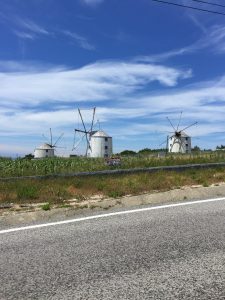When I first enrolled at Columbia, I was convinced that I would study Biochemistry. While my profound appreciation for the discipline has not dissipated; my academic, professional, and personal commitments have pivoted. All this to say, LitHum was the first

Windmills in Portugal, Photo Credit: Elliott Hueske
course that opened my eyes to the humanities world—encouraging abstract thinking and knowledge
acquisition in a way that was entirely new to me. Part of what was so illuminating and different from my STEM courses was the encouragement to reexamine the nature of reality through the narratives and figurative devices of the texts we were studying. Never before had I felt compelled to interrogate what the concept of reality means, and how reality as we know it can be questioned. I now found myself in a place where inquiries of this nature were not only typical but encouraged.
While reading Confessions by Augustine, temporal constraints were considered in relation to the present moment (i.e., “reality”). Augustine presents a picture of the human inclination to associate reality with definitive time points. This reality is challenged when we transition into the world of allegory—a place that blurs the lines of reality with symbolism (such as in Augustine’s conversion scene). Augustine makes the claim that the present moment is infinitely divisible and thus is immeasurable. We are then asked whether these qualities make the present undefinable. Unlike the past and future, the present has no duration because it is the only time that we truly experience. Augustine is pressing the case that time as we know it does not really exist, but this does not mean that we don’t perceive time. Rather, we perceive present reality. For Augustine, the ability to synthesize the past and future while circumventing the present is the psychological force of attention. When we experience deep focus, we are not really in the present. Furthermore, when we reflect on the past, we are not analyzing the past itself, but the memory of the present events of the past. This is related to Augustine’s conception of memorization such as in the case of reading aloud. When someone recites text, they must anticipate what will come next and consider what happened before as if we are standing still while time moves backwards. This was absolutely captivating to me given that I had never before been in an environment that motivated me to consider these kinds of philosophical debates about the nature of time and reality.
We also are asked to consider reality in Dante’s Inferno. The very text itself consistently gestures to real historical dates. For example, the line “when I had journeyed half of our life’s away,” suggests that Dante would have been around 35 years old. Moreover, we can place the exact time of the day to a Thursday night using the stars that are described. The narrative modulates between reality and something that is not quite tangible—a realm of symbolism and figurative language. We are constantly questioning the difference between the literal and the figurative; for example, is Dante really in a forest or is this an allegory, or both? The “right path” necessarily must be understood as figurative and psychological, but also as literal given that Dante was exiled from Florence and thus finds himself essentially lost. Every detail is bound to human temporality even though it is challenging for Dante to measure time in Hell. For example, he emerges from Hell just before Easter Sunday.
Lastly, Don Quixote by Cervantes centralizes reality that is manipulated and blurred by literary narratives. Don Quixote’s reality is idealistic to the reader and to the people that he interacts with. His actions are constantly conflicting with the realities of the world, while simultaneously infused with the fantasy of a feudal past. His active idealism has real-world effects and often is the source of his suffering. Yet the minute that Don Quixote lets go of his idealism, he dies. Although this is presented as a defeat of sorts, it can also be interpreted as a retreat into another fantasy as marked by the switch from a model of chivalric romances to scripture and The Bible. The world keeps the narrative in a state of delusion as fictional events guide experiences that have implications for reality.
For a student who had been entirely insulated in the world of hard science and empirical research, the notion that a literary work could dismantle conceptions of reality through explorative and whimsical language and plot was exciting and even revolutionary. It opened my eyes to the diverse realms of thinking that I could inhabit by pursuing fields in the humanities further. Yet this is not to discount Biochemistry which I feel also offers interesting interconnections with the idea that realities can be challenged. For example, when observing the world of atoms or genes, it feels definitively unlike our present macroscopic reality.
